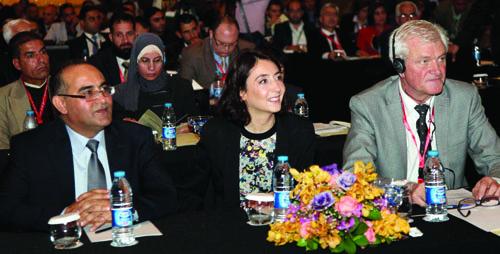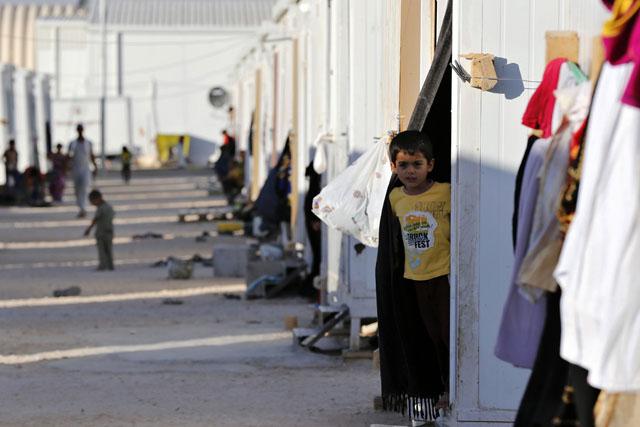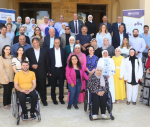You are here
Int’l community met only 30% of required support for Syrian refugee crisis — Jordan
By Khetam Malkawi - Dec 08,2014 - Last updated at Dec 08,2014

DEAD SEA — Government officials and UN representatives on Monday said the international community should not only provide emergency aid for Jordan, but also offer support in the long run for hosting 1.4 million Syrians.
Officials said the impact of hosting Syrian refugees will continue to affect the country for years, putting severe pressure on Jordan’s resources and infrastructure, in addition to its economy.
Planning Minister Ibrahim Saif said the Kingdom’s economy lost 1 per cent of its gross domestic product due to the Syrian crisis.
He noted that the country’s economy is already burdened with other concerns that include unemployment and development, and “we are trying to deal with these challenges away from the context of the Syrian crisis.”
The challenge of dealing with the impact of the Syrian crisis was worse due to the lack of funds, Saif said, noting that it covered only 30 per cent of what was needed in 2014.
Speaking at a conference titled “Syrian Refugees in Jordan: The Question of Society and Media”, the minister voiced hope that the response for next year will be better, referring to the Jordan Response Plan that was launched last Thursday listing projects to be provided for Syrians and host communities in Jordan in 2015.
However, in case the country does not receive the needed $2.8 billion to implement these projects, priority will be given to health and education.
Meanwhile, Rida Btoush, vice chairman of the National Centre for Security and Crisis Management, saidhosting refugees is not new for Jordan, having received several waves of refugees over the years.
However, the wave of Syrian refugees has different administrative and security characteristics. He cited the conflicts among Syrian refugees themselves between regime supporters and the opposition, which sometimes lead to violence in the camps.
In addition, 51 per cent of Syrian refugees are young people who are 18 years old and younger and this, according to Btoush, puts more pressure on health and education facilities.
The health system is one of the most affected by the refugee crisis, said Daifallah Lozi, secretary general of the Health Ministry.
According to Lozi, 1.33 million Syrian refugees have benefited from public health services since the beginning of the crisis in 2011 until the end of September this year, at a cost of JD864 million.
He added that 1.18 million vaccines were given to Syrian children over the past four years.
Meanwhile, UNHCR Representative to Jordan Andrew Harper stressed the importance of long-term support for Jordan, and the role of media in covering the refugee crisis and the efforts exerted by government and UN agencies to support them.
He noted that refugees are going to be here until there is a political solution in their country and reconstruction begins, which highlights the need for continuous support to host countries.
“We should invest in Jordan’s infrastructure,” Harper said, adding that the focus should be on how long Syrians will stay in this country rather than how many Syrians are here.
The three-day conference is organised by Jordan Media Institute (JMI) in cooperation with the Norwegian Institute of Journalism (NIJ), and was launched under the patronage of HRH Princess Rym Ali.
Speaking at the opening of the conference, JMI Dean Bassem Tweisi said the event is being held while the Syrian crisis is close to its fifth year and becoming more complicated.
Although the crisis is taking long and the issue of refugees has been tackled in the media from different aspects, Tweisi urged the media to keep considering it as a hot issue.
Frode Rekve, director of the Free Media Programme at the NIJ, agreed.
He said the question of refugees and media represents a great challenge with issues related to imbalanced reporting, fact finding and the question of whom to trust.
Rekve urged journalists to give voice to ordinary Jordanians and refugees themselves when reporting about the crisis.
Related Articles
The Jordan Media Institute (JMI) will organise an international conference titled “Syrian Refugees in Jordan: The Question of Community and Media”, between December 8-10.
Jordan and the UNHCR on Thursday warned that they might not be able to provide the same level of assistance to the Syrian refugees without further support from the international community.
Jordan is one of the countries most affected by the Syrian crisis, UNHCR Representative Andrew Harper said Tuesday.















